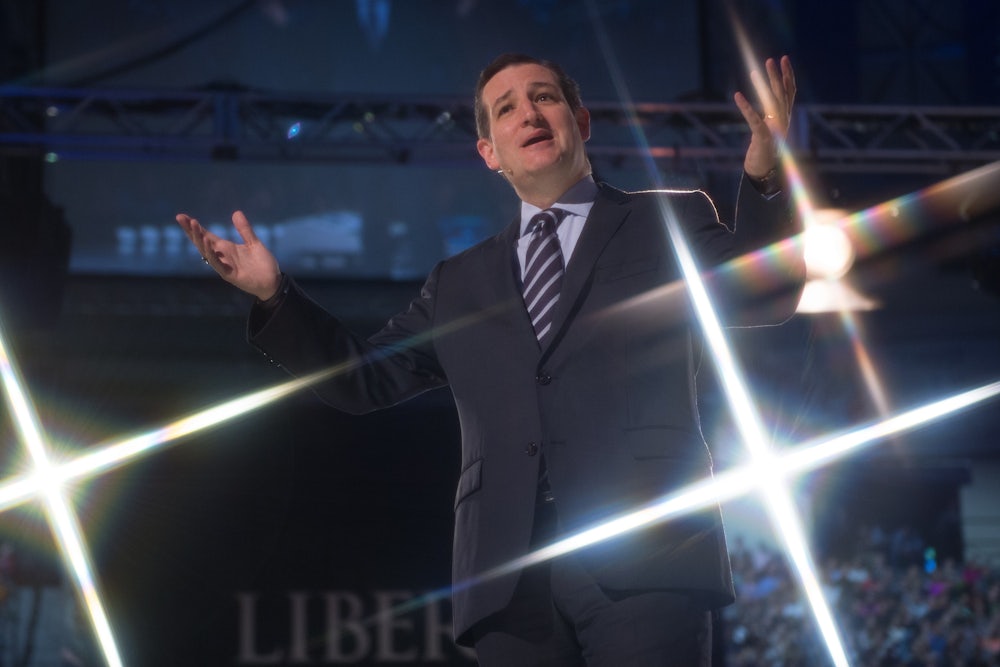Senator Ted Cruz’s impressive victory in the Iowa caucuses, and the combined dominance of Cruz and Donald Trump—two candidates attempting hostile takeovers of a party that hates them—is a seismic political event, which may herald a nominating contest like nothing we’ve seen in decades.
In the context of the zero-sum race for delegates, the story out of Iowa is that Cruz upset Trump, and that Marco Rubio outperformed expectations with 23 percent of the vote in third. But from the perspective of the ongoing GOP struggle to define itself, this is a small twist on a story that has dominated the race for months.
Just over a week from now, the Cruz/Trump insurgency will charge into New Hampshire—where Trump currently holds an enormous lead over Cruz and Rubio—leaving Republican elites with a narrow window to intervene on Rubio’s behalf. Even if they act expeditiously, though—even if Rubio parlay’s his performance into a big fundraising haul and a burst of endorsements—it’s unclear whether the party has the clout to force anyone out of the race, let alone to convince voters not to defect to Trump or Cruz.
Even before Monday night’s developments, the Trump and Cruz juggernauts were making political scientists rethink the notion, drawn from an influential, eponymous book, that the party decides whom it selects to run for president.
Of course, a single nominating contest can’t on its own refute a thesis drawn from an academic analysis of multiple, full primary cycles. And if you squint with Martin O’Malley-like intensity, you can square the Party Decides thesis with the observed results. On the one hand, the Iowa Republican electorate is uniquely conservative, and denied Trump a first-place finish in favor of an elected GOP official. On the other—yes, it is true—Senator Marco Rubio performed unexpectedly well, and could plausibly come from behind in upcoming contests, eventually eclipsing both Cruz and Trump.
But I think the better way to square the above thesis with the outcome in Iowa, and with a calendar that promises a Cruz/Trump one-two punch in the next two primary contests, is by looking at all the ways the GOP has essentially decided to cede the power to determine who rises and falls in the party.
The Republican Party did not decide to elevate Ted Cruz to frontrunner status. To the contrary, Republicans (and many others) compared Cruz to Barry Goldwater, and, rather bafflingly, made a concerted effort to weaken Cruz in a way they never did to Trump.
But over the past several years Republican leaders made a variety of decisions that prefigured both the Trump phenomenon and Cruz’s Iowa victory:
- The decision to organize a hysterical scorched earth obstruction and propaganda campaign against President Obama, priming Republican voters to expect their party to elevate unyielding Obama antagonists.
- The decision to allow the faces of the conservative entertainment complex to become influential party actors.
- The decision to grant a reactionary faction of elected Republicans veto power over the party’s agenda, and to reject the conclusion that the party’s foremost imperative was to be more welcoming to minorities and immigrants.
- The decision to allow Cruz not just to shut down the government, but, in so doing, to burnish his reputation as the party’s most vigorous Obama fighter.
- The decision to lay nary a hand on Trump for six months as he single-handedly shaped the party’s primary debate.
The GOP now falls back on its hope that Rubio can convert his third-place performance in Iowa to a leap into second place in New Hampshire next week, and, eventually, to outright victory in some future primary.
But that won’t happen unless Cruz inexplicably fails to capitalize on his come-from-behind Iowa victory, and Trump somehow collapses after a perfectly respectable second-place finish there. Until then, everything we’ve seen for months suggests Republican voters want to deny the Republican establishment a victory. That’s exactly what they did in Iowa, and they did it because the establishment decided, through years and years of fecklessness, to let them.
